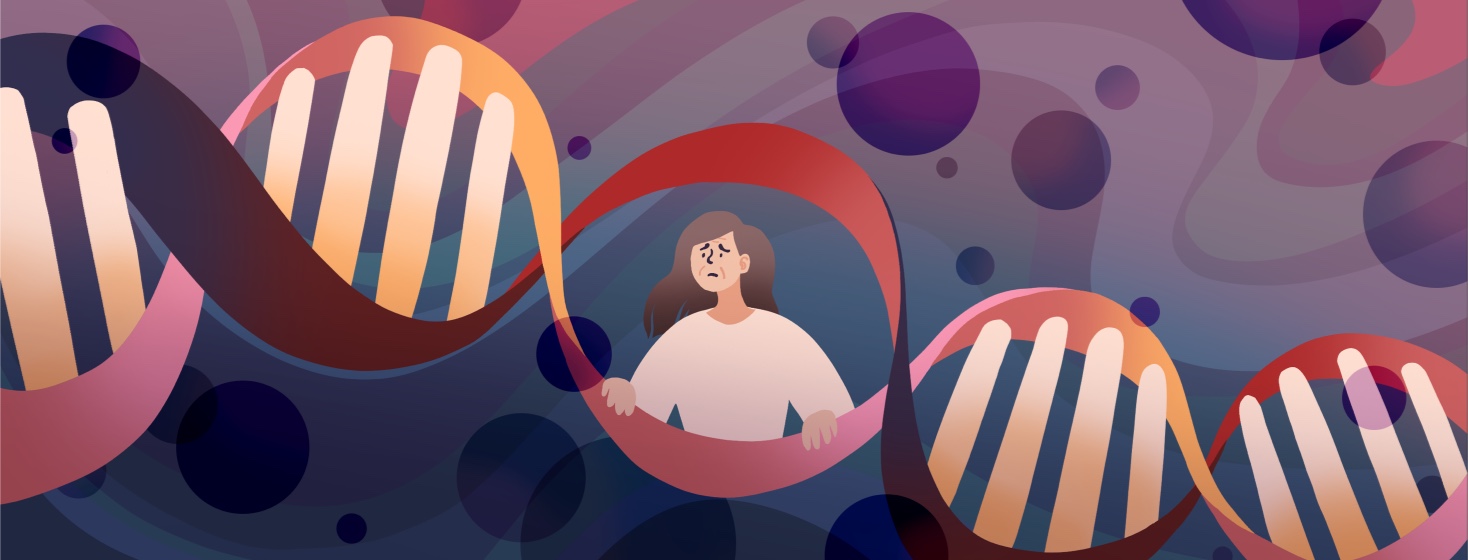Pompe Disease and Genetics
Reviewed by: HU Medical Review Board | Last reviewed: January 2023 | Last updated: May 2025
Pompe disease is a genetic condition. People with Pompe disease have changes in specific genes that impact how they break down sugar. These gene changes are called gene, or genetic, mutations.1-3
Understanding genes
Genes carry information in your body. They tell your body how to make proteins, cells, or other important things you need to survive. Some genes control visible things, like your eye color or hair color. Other genes carry instructions for things so small that we cannot see them. This includes instructions for how our cells work.4
Gene mutations linked to Pompe disease
In people with Pompe disease, genetic mutations affect the way a certain protein works in their body. This protein is called acid alpha-glucosidase (GAA). GAA plays a role in breaking down a complex sugar called glycogen into smaller sugar molecules. Your body uses these smaller molecules for energy.1-3
Because of certain genetic mutations, people with Pompe disease do not have enough active GAA. Right now, there are over 600 different gene mutations that can lead to low GAA and Pompe disease.1
Types of Pompe disease
Pompe disease can show up in infants (infantile-onset Pompe disease) or in older children or adults (late-onset Pompe disease). Which type a person has depends on which genetic mutations they have.1-3
People with infantile-onset Pompe disease have little to no active GAA. This leads to muscle weakness and heart disease very early in life. In people with late-onset Pompe disease, some GAA is present and working. This can prevent symptoms from appearing until later in life.1-3
Specific gene mutations can help predict how early a person will show symptoms. But there can still be a lot of variety between people. Both genes and the environment a person lives in play a role in when symptoms appear and how severe they are. Experts are actively studying these factors to learn more.1,3,5
Being a carrier versus having Pompe disease
We inherit, or receive, our genes from our parents. We have two copies of every gene. One copy comes from our mother, and the other comes from our father. If a parent has a mutated gene, there is a chance they will pass it down to their baby.4
The gene copies we get from each parent are random. These random combinations of genes are why we are different from each other, even from our siblings.4
With some conditions, only one mutated gene is needed for the baby to have the condition. In others, like Pompe disease, both copies of the gene need to be mutated for the baby to have it. Diseases that require both copies are called autosomal recessive disorders.5
So, people with only one mutated gene will not have Pompe disease. Instead, they will be a carrier. Many people who are carriers for Pompe disease will never know it. But carriers can pass down a mutated gene to their baby. If they pass the mutation on while the other parent does not, the baby will be a carrier, like them. But if both parents pass down a mutated gene, the baby will have Pompe disease.1,5
The role of genetic counseling
Genetic counselors can be helpful in diagnosing genetic issues. They also can help predict how a genetic disease might show up over time. For example, if you have a mutation that is linked to late-onset Pompe disease, your condition likely will be slower to progress and less severe.1,3
Genetic counseling is a useful tool in family planning. If you have a family history of a genetic condition like Pompe disease, you may want to get tested to see if you are a carrier. Your partner can be tested too. This can help determine whether your baby will be at risk. If neither you nor your partner, or only one of you, is a carrier, your baby probably will not have Pompe disease.6,7
Genetic counseling may also be used to test the siblings of a person with Pompe disease to find their risk of having the condition. It is also possible to test for the genetic mutations linked to Pompe disease before a baby is born.6,7
Some genetic tests are covered by health insurance, and others are not. A genetic counselor can help you navigate payment as well.6,7
Finding a genetic counselor
Genetic counselors can help recommend genetic tests and interpret the results. What you decide to do with the results is up to you and your loved ones.6,7
To find a genetic counselor, first ask your doctor. Many specialists, like neurologists, work closely with genetic counselors. If you are pregnant or trying to become pregnant, your primary care or ob-gyn doctor can help direct you.6,7
There are also resources you can use on your own. The National Society of Genetic Counselors has a searchable directory. Or you can search the clinic directories published by the American College of Medical Genetics and Genomics.

Join the conversation